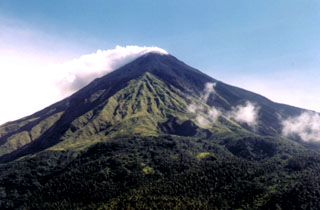Report on Karangetang (Indonesia) — 28 October-3 November 2015
Smithsonian Institution / US Geological Survey
Weekly Volcanic Activity Report, 28 October-3 November 2015
Managing Editor: Sally Sennert.
Please cite this report as:
Global Volcanism Program, 2015. Report on Karangetang (Indonesia) (Sennert, S, ed.). Weekly Volcanic Activity Report, 28 October-3 November 2015. Smithsonian Institution and US Geological Survey.
Karangetang
Indonesia
2.781°N, 125.407°E; summit elev. 1797 m
All times are local (unless otherwise noted)
Based on observations conducted at the Karangetang Volcano Observation Post in the village of Salili, PVMBG reported during 15-22 October activity remained stable. The lava dome was incandescent at night and produced a lava flow that traveled 600 m S. Incandescent avalanches from the lava-flow front traveled as far as 2 km E down the Batuawang and Kahetang drainages, 1 km down the Batang (S) drainage, and 1.8 km down the Kali drainage. Seismicity decreased, but continued to be dominated by signals characteristic of avalanches. Harmonic tremor was also detected. The Alert Level remained at 3 (on a scale of 1-4); visitors and residents were warned not to approach Karangetang within a 4-km radius.
Geological Summary. Karangetang (Api Siau) volcano lies at the northern end of the island of Siau, about 125 km NNE of the NE-most point of Sulawesi. The stratovolcano contains five summit craters along a N-S line. It is one of Indonesia's most active volcanoes, with more than 40 eruptions recorded since 1675 and many additional small eruptions that were not documented (Neumann van Padang, 1951). Twentieth-century eruptions have included frequent explosive activity sometimes accompanied by pyroclastic flows and lahars. Lava dome growth has occurred in the summit craters; collapse of lava flow fronts have produced pyroclastic flows.
Source: Pusat Vulkanologi dan Mitigasi Bencana Geologi (PVMBG, also known as CVGHM)

